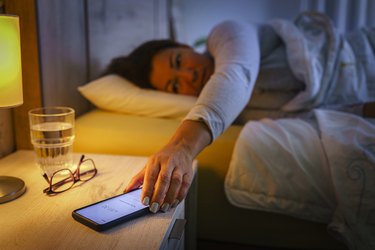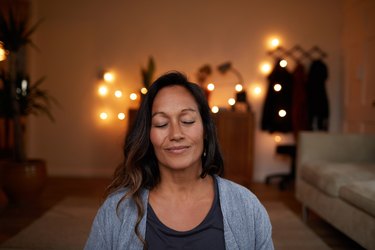
Traveling can leave you dead tired. But if you're like most people, you still can't fall asleep the second your head hits the pillow. In fact, it's par for the course to have a tougher time sleeping when you're away from home.
Why Is It So Tricky to Sleep When You Travel?
Video of the Day
There are a few factors that can make shut-eye more challenging when you're not at home:
Video of the Day
Jet Lag
Jet lag certainly plays in if you're traveling to another time zone.
"Changing time zones means that our internal clock is out of sync with the local environment, specifically with the light-dark cycle," explains Spencer Dawson, PhD, a licensed clinical psychologist and sleep expert and assistant clinical professor of psychological and brain sciences at Indiana University.
It can take some time — about a day for each time zone you cross — to adjust and fall asleep easily at your typical bedtime (and rise at your typical wake-up time).
The First-Night Effect
But travel sleep woes don't just come from jumping forward or back a few hours. Even if you're staying in the same time zone, it's harder to sleep soundly in a new environment.
"It's a known phenomenon in the rules of sleep called the first-night effect," says Steven Feinsilver, MD, director of the Center for Sleep Medicine at Lenox Hill Hospital in New York. The first-night effect is associated with one hemisphere of your brain staying more active than the other so as to "monitor unfamiliar surroundings during sleep," according to a May 2016 study published in the journal Current Biology.
Plus, the standard supporters of good sleep — a room that's cool, dark and quiet — can be harder to come by when you're away. "Sleep also relies on a consistent routine, and everything may be different during travel," Dr. Feinsilver adds.
Even with these obstacles, there are ways to snooze better when you're on the move. Take a look at go-to strategies recommended by these two sleep experts:
1. Make the Room Dark and Comfortable
If you're used to sleeping in a cool room with minimal light flooding in, try to mimic that setup where you're staying, Dawson recommends.
Check the thermostat and adjust it as needed — between 60 and 67 degrees tends to be optimal for sleep. And if the room has shades or curtains, close them up. Or, if you packed one, put on a sleep mask.
2. Stick to Your Usual Routine
A solid set of nightly habits tells your brain to start winding down for sleep. Problem is, most of us don't stick to our normal behaviors when we're traveling, Dr. Feinsilver says. You might eat a later dinner with heavier food and more alcohol, or fall asleep to a movie in your hotel room rather than read quietly before falling asleep.
While you might not be able to do everything exactly the same as you would at home, sticking to the same general routine can help prime your brain for bedtime, he explains. (It might help you avoid bathroom problems too.)
3. Prepare for the Morning
Travel tends to come with some amount of stress and anxiety around your plans, Dawson says.
Whether you've got to be up at a certain time for an early scuba diving lesson or you're keyed up to give a big presentation, once you lay in bed, your mind might start mulling over all the things you have to do tomorrow. Making sure you have everything set the night before — clothes laid out, breakfast plans made, laptop and charger packed up — can eliminate some of that stress.
"I organize what I'll need for the morning so I can know what to expect and have no reason to worry," Dawson says.
4. Set an Alarm That Will Force You to Get Up
Those worries for the next day might include the possibility that you oversleep and end up being late for an important event (especially if you've spent half the night tossing and turning).
So take extra preventive measures that'll help you rest easier: "If I need to get up earlier than my body is used to, I'll set an alarm on my phone, turn the volume up and place it across the room to prevent me from abusing the snooze button," Dawson says.
5. Don't Stress Too Much
"The worst thing you can do for sleep is worry about sleep," Dr. Feinsilver says. "If you are traveling for pleasure, enjoy it, and recognize that we can do okay with a single night of sleep deprivation."
As long as you get back to getting your standard amount of sleep once you're home, you'll be fine.
Was this article helpful?
150 Characters Max
0/150
Thank you for sharing!
Thank you for your feedback!
Is this an emergency? If you are experiencing serious medical symptoms, please see the National Library of Medicine’s list of signs you need emergency medical attention or call 911.


